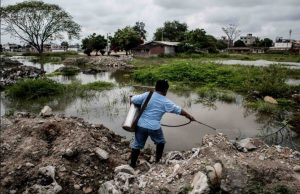
GAINESVILLE, FL – New research co-authored by UF Geography’s Dr. Sadie Ryan and Ms. Cat Lippi sheds light on the climate suitability for Aedes aegypti and Aedes albopictus mosquitos and transmission rates of Zika, chikungunya, and dengue fever.
The study, published in PLOS Neglected Tropical Diseases compares new data driven models of Zika, chikungunya, and dengue fever transmission to real world measurements of human infections caused by bites from Aedes aegypti and Ae. Albopictus mosquitoes. These models confirm that temperature is the single most important factor for predicting the rate and geographic spread of epidemics of these mosquito-borne diseases. Temperature influences transmissibility in many ways – affecting the lifespan of an individual mosquito, and determining biting frequency and the reproductive rate of the virus within the mosquito.
The collaborative research team includes experts in epidemiology, public health, ecology, mathematical modeling, and geography, and was funded by a grant from the National Science Foundation’s Ecology and Evolution of Infectious Disease program (NSF-DEB 1518681).